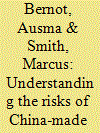|
|
|
Sort Order |
|
|
|
Items / Page
|
|
|
|
|
|
|
| Srl | Item |
| 1 |
ID:
181943


|
|
|
|
|
| Summary/Abstract |
Building a national system of social governance (guojia zhili tixi), which is the long-running governance dream of Xi Jinping, has triggered the creation of China’s ‘smart state’ using the tools of new information technologies to advance governance capacity (zhili nengli). These systems were already deployed nationally when the COVID-19 pandemic hit China, but were connected at a lesser capacity, targeting specific domains of security, industry or government administration. In response to the crisis, multiple technologies have been merged, exceeding the scope of their originally intended functions. This is known as function creep, when surveillant technologies remain functional past achievement of their intended purpose, or surveillant assemblages, where multiple surveillant technologies are combined. As more countries turn to digitalisation to increase public security and intensify social and market governance, the expansion of surveillant functions in China and their now-palpable effects on people’s lives raises new and pressing questions for scholars and decision-makers alike.
|
|
|
|
|
|
|
|
|
|
|
|
|
|
|
|
| 2 |
ID:
192082


|
|
|
|
|
| Summary/Abstract |
In the global interconnected economy, China-made information-collecting technologies such as closed-circuit television (CCTV) surveillance cameras have become popular products for routine video-based surveillance. Hikvision and Dahua are the two largest global suppliers of CCTV cameras, with both companies supplying their products to over 200 countries. Despite their popularity, national security concerns are commonly cited when adopting these cameras, citing manufacturer links with the Communist Party of China (CPC), cybersecurity vulnerabilities, and sales recorded in the Xinjiang region, that has records of human rights violations. This paper is structured in three parts: first, we explore the predominance of China-made information-gathering technologies in Australia; second, we summarise common national security concerns usually associated with China-based technology manufacturers; and third, we propose regulatory measures to regulating China-made CCTV cameras in Australia. The paper suggests that while state and Federal decision-makers are free to remove Chinese CCTV surveillance cameras, they should avoid overt politisation. Overall, a stronger focus should be placed on evaluating cybersecurity risks of Internet of Things (IoT) information-collecting technologies and considering their timely and effective regulation from the perspective of individual and national interests.
|
|
|
|
|
|
|
|
|
|
|
|
|
|
|
|
|
|
|
|
|